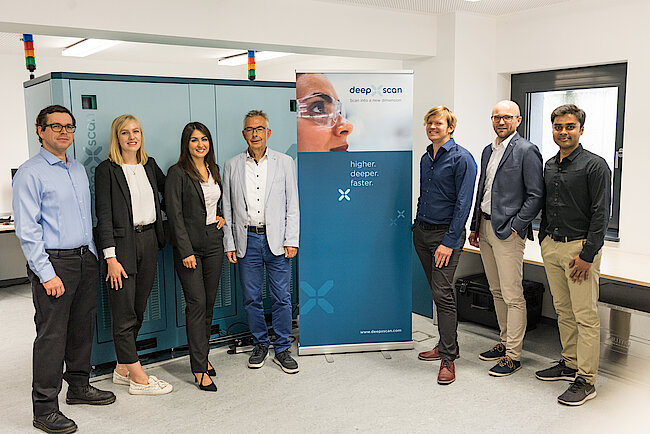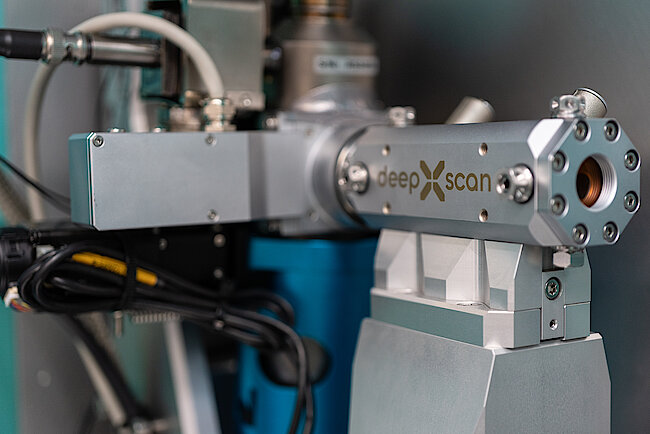
CTO Prof. Dr. Ehrenfried Zschech

The deepXscan team

A look into the X-ray microscope, and its high-precision X-ray optics and positioning systems
deepXscan GmbH
-
Sector: scientific equipment manufacturing
-
Designation: CTO
-
Established: 2021
-
Employees: 10
From science to entrepreneurship: Prof. Zschech, what is your vision and motivation that led to the founding of deepXscan?
We develop and commercialize X-ray microscopes that enable us to visualize the three-dimensional microstructure of materials and do it without destroying the material. Moreover, we can do this at sub-micrometer resolution and that means we can apply all this new information to develop new materials faster and e.g., to make microchips more robust. That is a strong motivation, because new materials – for instance those required for sustainable energy technologies and for nanoelectronics – are crucial for a better world, or as Director Rafael Laguna de la Vera of the Federal Agency for Disruptive Innovation SPRIND put it, “to return the world into balance.” I also have a very personal motivation: It quickens my pulse when I get to turn mere ideas into new solutions, when I can take research in physics or materials science and see them turn into innovations and new products for the market. That’s what I’m doing along with a highly motivated team of physicists, engineers and computer scientists. In the past, light microscopy and electron microscopy have led to disruptive innovations. The relatively new X-ray microscopy I believe, has at least as much potential, and I am convinced that we can use it to push the boundaries not only in microelectronics, energy storage and conversion, but also in cell biology and medical diagnostics.
What are the critical steps in transferring a product from science to industry?
Once we got the company started, there were a number of formalities that needed to be handled: we needed to find laboratory and office space, and most importantly, put together a good start-up team. We got expert advice in the beginning from innovation managers at SPRIND gave us expert advice, and we were able to convince SPRIND and the City of Dresden’s Economic Development Department that our plans had really high innovation potential, and we were selected for further support. Something that was decisive in our case was that we already had established close partnerships with research institutions right from the start, with the Fraunhofer and the Max Planck Institutes in Dresden for example.
Did your connection to the DGM play a role in founding the company?
The DGM has been my “scientific home” for more than three decades. My then PhD students Kristina Kutukova and Emre Topal and I put together the contribution “3D and nondestructive X-ray microscopy” for the forum “What materials science can achieve – between continuity and disruptive innovation” organized by Frank Mücklich and Oliver Schauerte on the occasion of the 100th anniversary of the DGM in 2019. I had numerous discussions with DGM members on the potential of X-ray microscopy for materials science and engineering, which encouraged me to found deepXscan GmbH together with Norman Huber in early 2021. Discussions in the X-ray tomography working group, which I chaired for many years, have made clear to me the great potential of X-ray microscopy as a novel research tool for materials scientists.
What personal skills are needed to successfully take an idea from science to its industrial application? Can anybody become an entrepreneur?
First of all, you have to be obsessed with an idea and you have to believe in its innovative potential. In addition, you need perseverance, tenacity and resilience to not let yourself be put down by setbacks. This already means that not everyone can become an entrepreneur. It has been my experience that you can turn an idea into a marketable product only with a strong team that is fired-up to fulfil a company’s goals. The start-up team of deepXscan is one such – bringing together highly motivated world-class experts in a team that is both multidisciplinary and multicultural
deepXscan is headquartered in Dresden. Why did you choose the Saxon capital?
We deliberately chose Dresden for our company headquarters. With the Technical University Dresden and numerous other research institutions active in the fields of physics, chemistry and materials science, Dresden is an excellent location for a deep-tech start-up. In addition, Dresden is the center of European microelectronics – every third microchip manufactured in Europe is made in Dresden. On top of this we have close contacts with the semiconductor industry “on-site”, and last but not least, Dresden is not only a dynamically developing high-tech and science location, but the whole state of Saxony has a varied and rich culture offering a wide range of leisure activities – put simply, a great place to live life to the fullest.
Thank you, Prof. Zschech for taking time for this interview. We wish you and your team all the best for the future.
All images reproduced with permission from deepXscan.
![[Translate to English:]](/fileadmin/_processed_/f/0/csm_logodgm-4_b2722eeace.png)
![[Translate to English:]](/fileadmin/user_upload/logodgm-4.png)